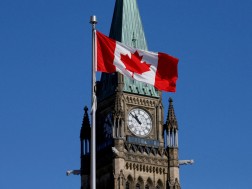Canada's maple syrup reserve - the world's only - has reached a 16-year low, raising questions about the future of a globally loved sweet staple in the face of climate change.
The reserve, located in Quebec, is designed to hold 133 million pounds of maple syrup at any given year.
But in 2023, the supply fell to 6.9 million pounds (3.1 million kg).
Experts link the shortage to both a rise in demand and warmer weather, which has disrupted production.
But they say that this will not affect the availability or price of maple syrup to consumers - at least for now.
"The strategic reserve is holding its lowest amount of maple syrup since 2008," Simon Doré-Ouellet, the deputy director general of the Quebec Maple Syrup Producers, told the BBC. "But we do not foresee any supply issues in the near future."
Canada's billion-dollar maple syrup industry accounts for 75% of the world's entire maple syrup production.
According to national data, a majority of that - around 90% - is produced in the province of Quebec, where the world's sole strategic reserve of maple syrup was set up 24 years ago.
The amount of maple syrup in the national reserve - stored in tens of thousands of barrels in several warehouses across Quebec - has dwindled significantly since 2020. That year, the reserve had more than 103 million pounds of the sticky product.
Now, the amount in the reserve is only 7% of what it was four years ago.
Part of the reason why, Mr Doré-Ouellet said, is because of poor harvest seasons over the last few years.
Maple syrup production, which is typically done between early March and late April, relies heavily on a delicate balance of below freezing overnight temperatures and warmer daytime temperatures above 0C (32F).
The cold temperatures help the maple tree absorb water from the soil, while the warmer weather during the day creates pressure that pushes water down to the bottom of the tree, making it easier to harvest the sap.
In 2021 and 2023, warmer spring temperatures felt across the country resulted in a reduction in maple syrup production, which fell 21% in 2021 from the year prior.
This reduction, however, came on the heels of two consecutive record years of production, in 2020 and 2019.
Mr Doré-Ouellet said that because of the harvest unpredictability, fluctuations in the reserve's supply are not unusual.
"The strategic reserve was put in place to stabilise supply - which is highly weather dependent - for buyers," he said. "In the last four years, that is exactly what it has done."
Coupled with the poor harvest years is a rising demand for for the golden product.
In 2021, Canada exported 161 million pounds of maple syrup to 71 countries worldwide - an increase of more than 19% from the year before.
Mr Doré-Ouellet said the growth in demand is tied to Quebec's efforts to promote Canadian maple syrup and its benefits to other countries, primarily the US, UK, Germany, Australia and Japan.
With the reserve supply dwindling in the face of growing demand, many are keen to see how the upcoming harvest season unfolds.
Canada is coming out of one of its warmest winters on record. Temperatures in December, January and February were the warmest since record-keeping began in 1948.
Despite this, Mr Doré-Ouellet said there is reason to be optimistic.
"The sugaring season has come early this year and is still underway," he said. "So far, production has been plentiful and the weather forecasts are encouraging for the next few weeks all across Quebec."
Because the reserve stabilises the maple syrup market for producers and buyers, he said it is important that it be built back up.
Efforts to do so are already underway, including the release of 14 million new taps to producers over the last three years to bolster harvesting efforts, he said.
Mr Doré-Ouellet did note that replenishing Canada's maple syrup supply is a "multi-year process", adding that he believes the outcome of the 2024 season will not "make or break" the future of Canada's most iconic export.
Source: BBC
















